'It is not the most vulnerable being brought to the UK - but those with passports and resources' - Dani Garavelli
She got to know the girls, now 14, in the summer of 2018, when they stayed in her home on a short health break organised by the charity Chernobyl Children’s Lifeline. “Nika was a very strong girl, very clever and eager to learn,” Leggat told me last week. “She sucked up everything about Scotland. And Dasha never stopped smiling.”
The news reports showed Borodyanka being pounded to oblivion. Desperate to help, Leggat tried to find the girls. Dasha’s aunt had grim news: Dasha and her mother had gone missing after their house was bombed. Later, Leggat was told they were on a list of evacuees, though this has not been officially confirmed.
Advertisement
Hide AdAdvertisement
Hide AdShe was, however, able to contact Nika and her mother, Natalya, and kept in touch as they fled their home, leaving Nika’s older brother with his wife and baby behind.
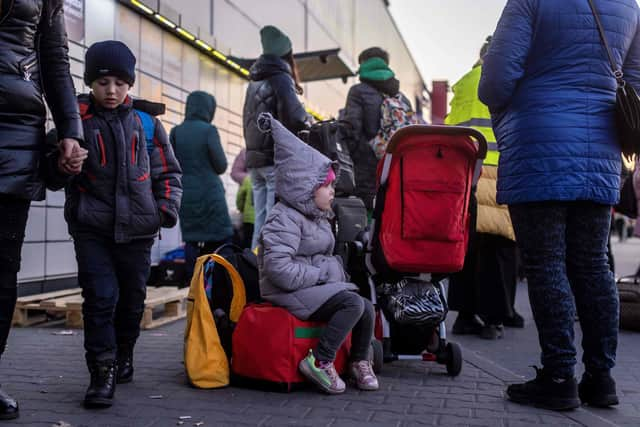

At first, only Ukrainians with close relatives in the UK were allowed to apply for visas, so there was little Leggat could do beyond sending messages of support. But then, under intense public pressure, Boris Johnson announced Homes for Ukraine: a scheme allowing individuals to sponsor named refugees, offering up spare rooms or empty properties as accommodation.
Leggat sprang into action. Within 48 hours, she had rented a small flat near her home in Coatbridge. This, she reasoned, would give Nika and Natalya their own space, while remaining close enough not to feel isolated. It was furnished by a local charity, Diamonds in the Community.
Natalya and Nika arrived in Poland on Thursday. They made their way to the Ukrainian Embassy, as advised, to secure visas. All that was left was for Leggat to fill in the sponsorship form. But she could not do that until it was available online, and she was given no further information in the interim. By the time I spoke to her on Friday morning, she was becoming increasingly agitated.
“I phoned the UK immigration office on Wednesday and Thursday and again this morning (Friday),” Leggat said. “I did get to speak to an actual person on one occasion and her advice was to go to the GOV.UK page. I said to her: ‘We have been on it a million times but I now have a family stuck in Poland and we don’t know what to do. We need to know how many days it’s going to take, and when to book their flights’.”
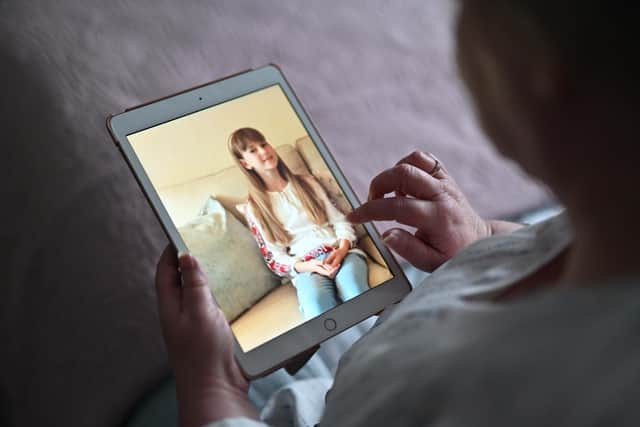

Leggat had booked a hotel room for Nika and her mum and another refugee. "Natalya is quite independent but the other lady is on her own," she said. "She had to leave her husband and cried the whole way from Ukraine. Her husband phoned her host family last night to say: ‘This is awful. My wife is scared, she is crying, no-one is helping her. She wants to return home’.”
Leggat said Neil Gray, the Scottish Minister with responsibility for Ukrainian refugees, had been helpful but that the Scottish Government was also waiting for news from the Home Office. “I am worried Natalya and Nika will feel let down,” she said. “They have been so brave in taking the steps to get to Poland. We need to show them we are ready and able to help them.”
***************
From the outset, the UK government’s response to those fleeing the Russian invasion has been sluggish.
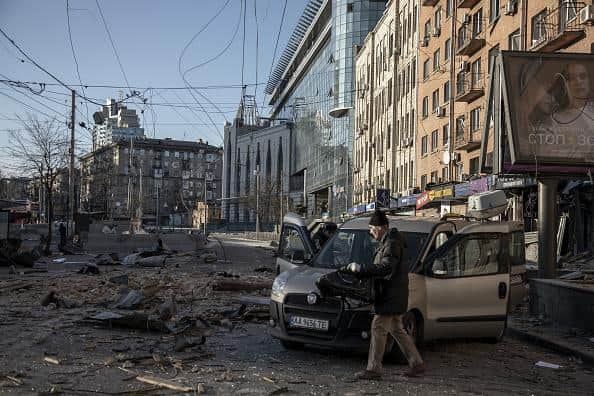

Advertisement
Hide AdAdvertisement
Hide AdWhile EU member states agreed to activate the Temporary Protection Directive so normal asylum procedures could be circumvented, the UK refused to waive visa requirements.
As millions made their way into Poland and Germany, UK immigration officials appeared to be making life as difficult as possible. Applications had to be made in person. Those trying to enter the country at Calais were expected to make onward journeys to processing centres in Paris, Lille and Belgium.
In the face of a public backlash, the government relaxed the rules, allowing those who had been displaced to begin the application process online. Then, it announced the Homes for Ukraine scheme, with those who agreed to sponsor and accommodate a named refugee offered £350 a month as a “thank you”. Ukrainian “guests” will be able to live and work in the UK for up to three years and access benefits, healthcare, employment, and other support.
Within a few days, tens of thousands of people had registered their initial interest and offered accommodation. And yet - almost a week on - there were still more questions than answers as to how the system would operate.
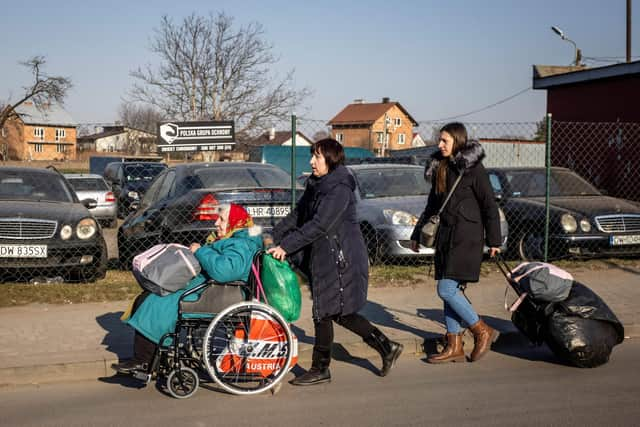

Those - like Leggat- who already knew Ukrainians they wished to sponsor were still unsure of what paperwork would be required, while those who didn’t had been given no information on vetting or the matching process.
Meanwhile, refugee charities were highlighting potential risks. They were concerned about the reliance on faith groups and third sector organisations to match and provide support, and about the £350 which they said made refugees vulnerable to exploitation. Eyebrows were also raised during an online sponsorship information evening run by the Sanctuary Foundation set up to link Ukrainians to potential hosts. Chat box comments included requests to be given “an orphan” and queries over the ethics of asking refugees to clean the house.
The UK government’s promise of a “light touch” approach to checks on sponsors has raised particular fears over safeguarding. These have been heightened by a lack of obvious local authority input. Daniel Sohege of anti-trafficking charity Love146, said the danger of placing vulnerable people outside of existing protection mechanisms had already been exposed by the policy of placing lone Afghan children in hotels. The charity says at least one child a week goes missing from those hotels.
“As more information [about the new scheme] comes out, the clearer it becomes how unsuitable and ill-prepared it is,” Sohege said. “If traffickers were to design something to maximise ways to exploit people, it would potentially look like this.
Advertisement
Hide AdAdvertisement
Hide Ad“As shown in the past, local authority mechanisms could be activated to provide necessary protection and support through a multi-agency, multi-disciplinary approach, which would meet immediate safeguarding needs.
“It takes a lot of work, but the model to do it, and ensure safeguarding is put first and foremost, exists. It is being ignored in favour of a brand new scheme based on public goodwill over experience and expertise.”
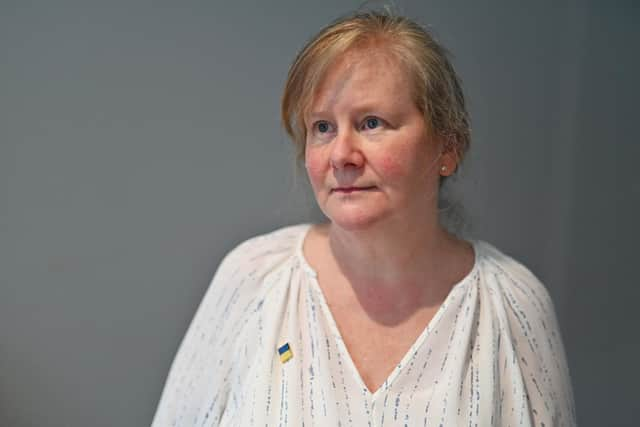

There are also worries about the lack of any exit strategy. Hosts are being asked to commit to a minimum of six months, which many consider too long. But what happens when this period comes to an end, or if placements break down before the six months is up? With no concrete plan to move refugees into long-term housing, will there be an upsurge in homelessness?
“The UK government has said faith groups and charities will help match hosts to refugees,” says Alison Phipps, UNESCO Chair in Refugee Integration through Languages and the Arts at the University of Glasgow. “But these groups are already at breaking point after the pandemic. The whole [enterprise] seems to be set up to fail. And the blame for that failure will land at the feet of those faith groups and charities even though [Homes for Ukraine] looks like something thrown together one night on the back of an envelope.”
*******
Frustrated by the UK’s government’s lackadaisical approach, the Scottish government is once again going its own way. In an effort to speed up the process, it is assuming the role of a “super sponsor”, taking immediate responsibility for up to 3,000 Ukrainians without relatives or pre-existing contacts in the UK. This removes the need for applicants to be matched to a named individual before they are cleared to travel. The first refugees to come via this route may have arrived in Scotland by the time this piece is published.
The immediate priority will be to place them in emergency accommodation: probably hotels, with the aim of moving them on as quickly as possible. Some will be given empty public or private sector properties. Others will be matched with Scots who have offered rooms through the Homes for Ukraine scheme. It is understood Disclosure Scotland has been contacted to ensure it has the capacity to expedite safeguarding checks on all potential hosts.
Many of the problems inherent in the national scheme exist here too. But a major difference appears to be that the Scottish government is working more closely with established NGOs, local authorities and COSLA as well as faith groups to ensure a joined-up approach.
Nicola Sturgeon announced £15 million to support Scotland’s response to the invasion of Ukraine, with just over £11m to be allocated to local authorities and £2.25m set aside for temporary accommodation. An additional £1.4m is being allocated to the Scottish Refugee Council for the expansion of its Refugee Integration Service
Advertisement
Hide AdAdvertisement
Hide AdThe First Minister has made it clear she wants refugees out of people’s spare rooms and into more settled accommodation well before the six-month Homes for Ukraine commitment period expires. This may be unrealistic given hundreds of Afghan refugees who came to Scotland last year are still stuck in hotels. But those escaping the Taliban were brought here under specific UK government schemes which made working with councils more difficult. Many of them wish to remain in cities rather than moving to local authority areas where social housing is more readily available.
The Scottish Government hopes the approach taken with the Ukrainians will be closer to the one which saw Syrian refugees successfully resettled in communities such as the Isle of Bute. It also hopes to set up befriending initiatives to provide support, signpost to other agencies and help with integration.
There are still concerns around the shortage of temporary accommodation and social housing, especially in Edinburgh. But refugee charities seem reassured the Scottish Government's approach is more realistic and collaborative than its UK counterpart’s.
“We have been working closely with the UK government to do everything we can to ensure those who have been displaced by the war in Ukraine come here as quickly as possible,” Gray said.
“It’s about trying to ensure the system is as simple and unbureaucratic as possible. We will continue to work over the coming days to ensure Scotland continues to provide the sanctuary the people of Ukraine deserve.”
*****************
On Friday afternoon, the Homes for Ukraine scheme finally went live, allowing all parties to fill in the relevant forms. That was good news for Leggat, who had been up all night constantly refreshing the page, and for Nika and Natalya, who know their application is, at last, being processed.
Yet Leggat’s dismay at the UK government’s lack of urgency continues. “I’m happy the forms have been completed, but we still can’t book flights or tell Nika and Natalya how long they have to wait,” she said.
There is a disconnect at the heart of the Tories’ approach, a product - their opponents claim - of being forced to extend a welcome to victims of war after years of anti-immigration rhetoric and particularly while its Nationality and Borders Bill is going through the House of Lords.
Advertisement
Hide AdAdvertisement
Hide AdThis disconnect can be seen in Boris Johnson’s refusal to waive visas or to refer to fleeing Ukrainians as “refugees”. To do so might invite comparisons with those fleeing other forms of persecution such as those on the small boats turned away in the Channel. On Tuesday, as prospective hosts were registering their interest in the Homes for Ukraine scheme, more than 900 migrants attempting to reach the UK were intercepted by French and UK immigration officials: the largest in a single day so far this year.
The Nationality and Borders Bill would crack down on asylum seekers by making it a criminal offence to knowingly arrive in the UK “illegally” and introducing a maximum sentence of life imprisonment for those who facilitate illegal entry into the country.
“The government has not used the word ‘refugee’ on any of its statements or documents [about Ukrainians], which suggests they are putting clear blue water between themselves and the Refugee Convention,” Phipps said. “If you look at the UNHCR [ United Nations Commissioner for Refugees] legal opinion on the Bill you will see it has real extreme concerns that what is being proposed is in contravention of that convention.”
The UK government needs to treat Ukrainians as different from other asylum seekers so as not to undermine the Bill. But, in doing so, it has turned the idea of a humanitarian mission on its head: it is not the most vulnerable who are being brought to the UK, but those with passports and the resources to get themselves to a border.
As Sabir Zazai, CEO of the Scottish Refugee Council points out, there is likely to come a point where Ukrainian refugees without family ties or sponsors will attempt to make it to our shores without visas and they too could be criminalised.
The disparity in the way different groups of migrants/refugees are treated is also causing resentment amongst those who have settled here but are not entitled to bring their relatives from conflict zones.
Hayab Yohannes experienced detention, torture, trafficking and years mired in the UK’s asylum system after fleeing from Eritrea to Sudan in 2011. He is now a research associate at Glasgow University, but he has a teenage brother still in Eritrea.
“My brother has survived a year’s detention, six months of torture, trafficking and lives in fear of deportation and re-trafficking,” Yohannes said. “I want to sponsor him to join me in the UK, a country that I now call home. But the Home Office won’t allow that.”
Advertisement
Hide AdAdvertisement
Hide AdPhipps believes each new crisis creates a fresh clash of rights. “The UK government is proliferating schemes,” she said. “We have an Afghan scheme, we have a Hong Kong scheme, we had the Vulnerable Persons Resettlement scheme. All of these are bespoke to certain national groups rather than simply saying that, under the Refugee Convention, anyone coming out of a war zone or is seeking escape from persecution has the right to have their case determined and to go on to re-establish a normal life.”
Homes for Ukraine also risks creating division between those languishing in hotels and temporary accommodation and the newcomers whose housing needs may be perceived as being prioritised.
Phipps has accommodated around a dozen refugees through Positive Action for Housing’s (PAH) existing Room for Refugees scheme including her foster daughter, Rima. As a veteran of hosting, she is wary about the sudden upsurge of people offering their rooms, worrying that, while their intentions may be good, they might not fully understand what they are taking on.
“The £350 a month that has been offered moves this away from volunteering,” she told me. “It creates a different relationship to those we have seen grow through careful vetting, through PAH and through people being gently plugged into what’s going on. Often people come to hosting because they volunteer through Refuweegee and then they have got to know a few people and then they have realised how bad things are and they thought: ‘Actually we could do this’. They have a lot more awareness of what is going on rather than just thinking:’ We have to do something now’.”
So what advice would she give those who want to continue down this path? “In practical terms, make sure you have good WiFi so people can speak to those they want to speak to, be it their lawyers, their family back home or the local diaspora,” she said.
“Give them privacy. And don’t ask them to tell you what’s happened to them. Inform yourself about trauma and what to expect, and understand some of that trauma will rub off on you. Know how to steady yourself; and take one day at a time.”
************
This is sound advice for those hoping to host strangers. Meanwhile those, like Leggat, who are already in touch with specific Ukrainians are still mired in bureaucracy.
Johnny Sorensen and his Ukrainian wife, Tetyana, from Livingston, want to bring Teyana’s sister Svitlana and her son Oleksii over as close relatives, while acting as sponsors to Tetyana’s best friend Iryna and her son Oleksand.
Advertisement
Hide AdAdvertisement
Hide AdAll four lived in Tetyana’s hometown Chernyhiv which has also been devastated by shelling. They travelled together across the border into Poland and are currently in an empty flat belonging to friends of the Sorensens in Germany. They made their way there because they thought there would be fewer delays than in Poland.
Sorensen told me they had faced numerous obstacles. “When the girls fled from Ukraine all they had to do was to cross the border with their passport and that was it,” he said on Thursday. “The thinking in the EU was: get them to safety and process them after. But the UK was still dithering about security checks and forcing people to travel to visa centres.”
Svitlana and Oleskii followed the rules which kept changing. “They wanted to make the appointment while they were still in Poland, but you had to name the visa centre that you were going to attend,” Sorensen said. “They opted for Munich and made an appointment for four days’ time so we could be sure they’d get there. But then on Tuesday, you no longer needed to go in person; you could apply online. So we uploaded the documents digitally. We were told it would take two or three days to process them.”
Shortly after the Homes for Ukraine scheme was announced, Sorensen registered his interest in sponsoring Iryna and Oleksand. “But it only asked for the briefest of details. And since then there have been no emails, no updates. Nothing.”
When I phoned back on Friday evening, Sorensen was busy filling in the forms. “I have completed 20 pages of the first application, but I am only on section two out of five,” he told me. “They are asking questions about previous names and addresses even though some of those addresses no longer exist.
“As for the family application, four days after uploading the passport, we now have an email telling us the documents are being prepared to be looked at by someone else and please don’t travel yet.
“It is terrible that those who have already endured trauma should have their lives made so much more difficult.”
Comments
Want to join the conversation? Please or to comment on this article.